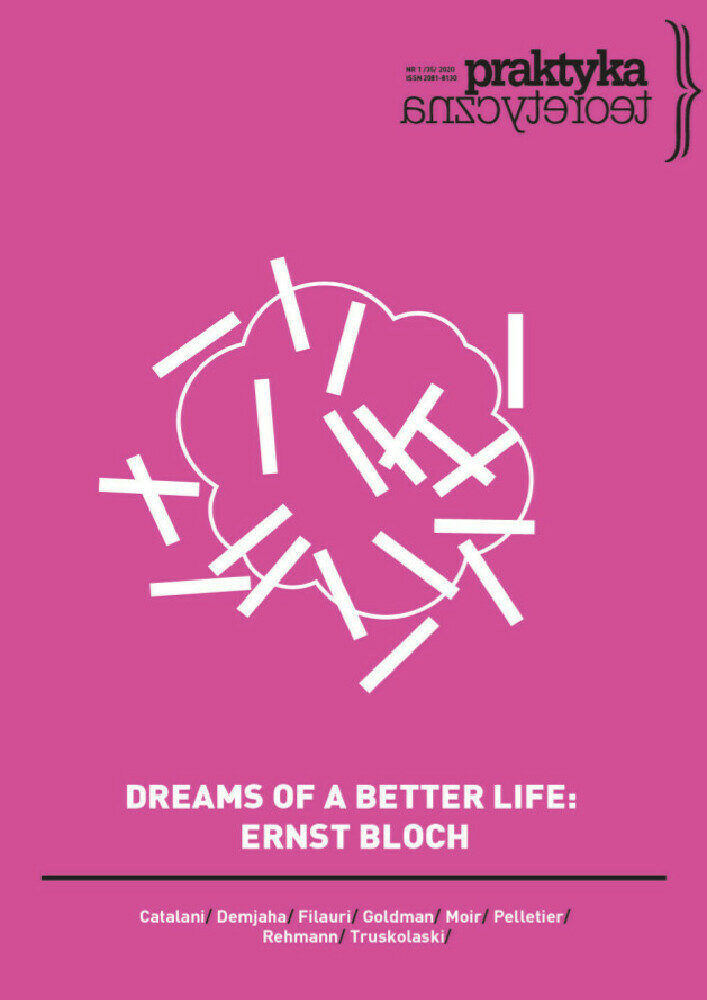Abstract
This paper concerns Ernst Bloch’s notion of “meta-religion,” which is an attempt to inherit the religious without inheriting religion, while distinguishing itself from a merely secular atheism. I assert that the key to this meta-religious inheritance is the structural abandonment of the Fall. Focusing chiefly on Bloch’s late work Atheism in Christianity, I provide an account of Bloch’s appraisal of Feuerbach as a progenitor of his meta-religious project, before moving on to what I argue is the key problem for what Bloch terms the “meta-religious” inheritance of Christianity: the question of the Fall. I argue that as Bloch’s own thinking regularly suggests, the archetype of the Fall is a necessary correlate of the archetype of freedom, and actually grounds an important aspect of Bloch’s meta-religious inheritance of both Christianity and Hegel as part of the same dialectical theorisation of the sources of Marxism.
References
Baader, Franz. 1851. Baaders Sämmtliche Werke vol. 2. Edited by Franz K. Hoffman. Leipzig: Verlag von Herrmann Bethmann.
Bonaventure. 2012. Breviloquium Et Itinerarium Mentis Ad Deum. Edited by Hefele. C.J. Charleston: Nabu Press.
Bloch, Ernst. 1968. Aheismus im Christentum. Frankfurt am Main: Suhrkamp Verlag.
———. 1962. “Hegel und die Anamnesis.” Hegel Studien 1: 167–181.
———. 1996. Tübinger Einleitung in die Philosophie. Frankfurt am Main: Suhrkamp.
———. 1969. “Universität, Marxismus, Philosophie.” In Philosophische Aufsätze, 277–278. Frankfurt am Main: Suhrkamp.
Berthold-Bond, Daniel. 1995. Hegel’s Theory of Madness. New York: State University of New York.
Chesterton, Gilbert Keith. 2011. The Quotable Chesterton. Edited by K. Belmonte. Nashville, TN: Thomas Nelson.
Colletti, Lucio. 1972. From Rousseau to Lenin. Translated by J. Merrington and J. White. London: Lowe and Brydone.
Feuerbach, Ludwig. 1881. The Essence of Christianity. Translated by M. Evans. London: Trübner & Co., and Ludgate Hill.
———. 2012. The Fiery Brook. Translated by Z. Hanfi. London: Verso.
Geoghegan, Vincent. 1996. Ernst Bloch. London: Routledge.
Glenn Friesen. 2015. Neo-Calvinism and Christian Theosophy: Franz von Baader, Abraham Kuyper, Herman Dooyeweerd, Calgary: Aevum Books.
Hegel, G.W.F. 1948. “The Positivity of the Christian Religion.” In Early Theological Writings. Translated by T.M. Knox. Chicago IL: University
of Chicago Press.
———. 1969. Vorlesungen über die Philosophie der Religion I, Werke 16. Edited by E. Moldenhauer & K. M. Michel. Frankfurt am Main: Suhrkamp.
———. 1991. Encyclopaedia Logic. Translated by T.F. Geraets et al. Cambridge: Hackett Publishing.
———. 2008. Philosophy of Mind. Translated by M. Inwood et al. Oxford: Oxford University Press.
———. 2010. Science of Logic. Translated by George Di Giovanni. Cambridge: Cambridge University Press.
Hodgson, Peter C. 2005. Hegel and Christian Theology. Oxford: Oxford University Press.
Hudson, Wayne. 1982. The Marxist Philosophy of Ernst Bloch. London: Macmillan.
Jameson, Fredric. 2016. Marxism and Form. Princeton, NJ: Princeton University Press.
Ling, Trevor. 1980. Karl Marx and Religion in Europe and India. London: Macmillan.
Marx, Karl, and Friedrich Engels. 1964. “The German Ideology”. In On Religion. New York, NY: Schocken.
———. 1975. Collected Works vol. 1. London: Lawrence and Wishart.
Milbank, John. 2006. Theology and Social Theory. Oxford: Blackwell.
Mondin, Battista. 1963. The Principle of Analogy in Protestant and Catholic Theology. New York, NY: Springer.
Plotinus. 1988. Enneads. Translated by A.H. Armstrong. London: Harvard University Press.
Taylor, Charles. 1991. Ethics of Authenticity. London: Harvard University Press.
Wolfson, Harry A. 1948. Philo vol. 1. Cambridge: Harvard University Press.
License
“Theoretical Practice” seeks to put into practice the idea of open access to knowledge and broadening the domain of the commons. It serves the development of science, thinking and critical reflection. The journal is published in open-access mode under the CC-BY-NC-SA 4.0 license (detail available here: http://creativecommons.org/licenses/by-nc-sa/4.0/). Articles published in the journal may be freely distributed, stored, printed and utilized for academic and teaching purposes without restrictions.
They should not be, however, used for any commercial purposes or be reconstructed into derivative creations. Access to the journal may not be limited or offered for a fee by any third party.
Prospective authors are obliged to fill in, sign and send back the publishing contract compliant with the CC licencing. [PL.pdf, PL.doc, EN.pdf,EN.doc].
According to this contract, authors grant the journal a non-exclusive right to publish their work under the creative commons license (CC-BY-NC-SA 4.0) without any financial obligation on both sides of the contract.
Before submission authors should make sure that derivative materials they use are not protected by copyright preventing their non-commercial publication. Authors are responsible for any respective copyright violations.
